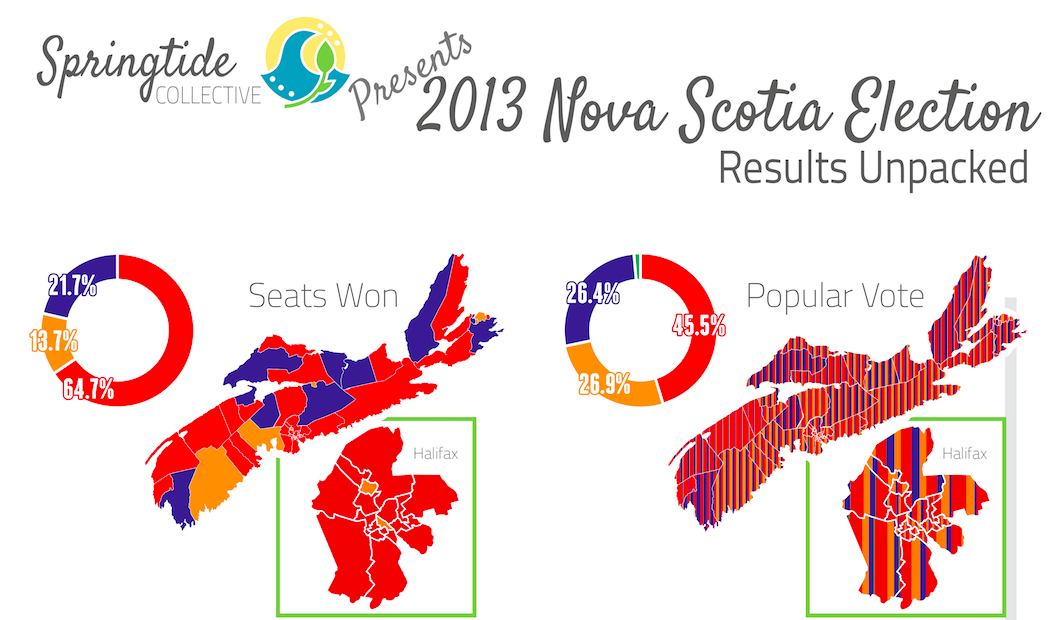Analysis of election results reveals deep problems with first-past-the-post electoral system. View PDF version (recommended).
A detailed analysis of the provincial election results suggests that Nova Scotia’s first-past-the-post electoral system has failed to represent the interests of voters at a number of levels.
The Springtide Collective, a public interest organization dedicated to improving the state of democracy for Nova Scotia, has compiled a number of troubling statistics in an illustrated report released today.
“Most Nova Scotians voted for candidates that lost and parties that won’t be the government,” said Springtide Collective president, Mark Coffin. “It’s evident that every vote does not count, that some votes matter more than others, and that majority does not rule in Nova Scotia elections.”
Some of the statistics presented in the report released today include the following:
Minority Rules:
416,241 Nova Scotians cast valid ballots in the 2013 election. 51 percent of those people voted for losing candidates.
In 32 of Nova Scotia’s 51 ridings, the majority of voters cast ballots for somebody other than the winning candidate.
The soon-to-be Liberal government holds 65% of the seats in the legislature, while having earned only 45.5% of the votes.
Second Place Switchers
Nova Scotia’s electoral system is extremely vulnerable to subtle shifts in voter support in close riding. Hypothetically, small numbers of voters, dubbed “second place switchers” could have changed the status of governing and opposition parties in the legislature:
- If 1,499 Liberal voters had voted for the runners-up in eight ridings where the Liberals won by the narrowest margins, Liberals would lose eight seats and hold only a minority of seats in the legislature, instead of a majority.
- If 1,046 NDP voters marked ballots for the second place candidates in all seven of the ridings where the NDP won, the party would have lost all seven seats in the provincial legislature.
- If 201 voters chose the NDP instead of the winning candidate in ridings won by the Liberals and PCs with the narrowest margins over the NDP, the NDP would be the official opposition with 11 seats.
No Silver Medals
Despite winning only seven seats, the NDP came second place in 27 ridings across Nova Scotia. They collected more “losing votes” (votes that did not elect candidates) than any other party – 87,136 in total.
Biggest Loser & Smallest Winner
It’s hard to say that all votes are anything close to equal, or even that every vote counts after looking at ridings like Sydney-Whitney Pier and Sackville-Beaver Bank.
In Sydney-Whitney Pier, the Liberal candidate, Derek Mombourquette came second place to NDP incumbent, Gordie Gosse, earning 4,511 votes (43.8%), more votes than any other second place candidate and more than 41 of the 51 winning candidates.
Meanwhile, Stephen Gough, the elected MLA in the riding of Sackville-Beaver Bank, won the seat for the Liberals with just 2,570 votes (40.2%), fewer votes than any other winning candidate across Nova Scotia, and fewer votes than 26 of the second place candidates across the province.
“When you add all of these anecdotes up, it becomes evident that our first-past-the-post electoral system is not an effective way of translating the public interest into a truly representative legislature,” said Coffin. “This isn’t just about political parties and candidates not getting what they deserve, it’s about voters getting something dramatically different than what we asked for.”







